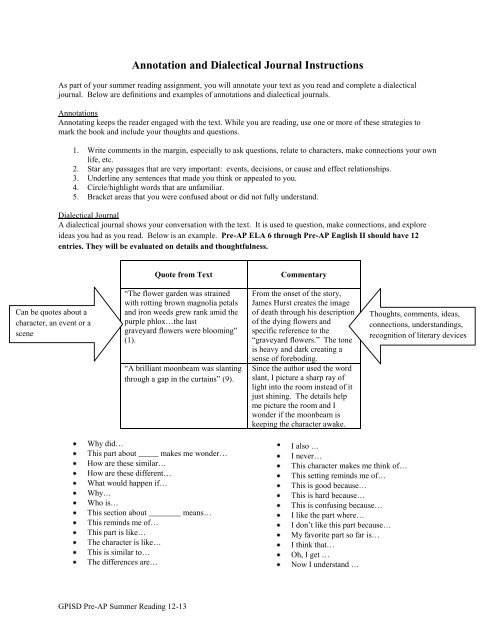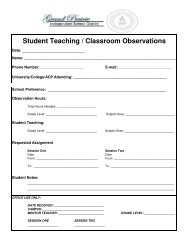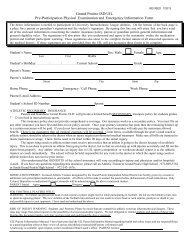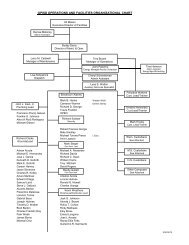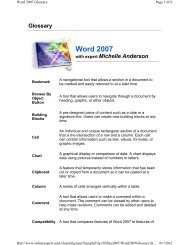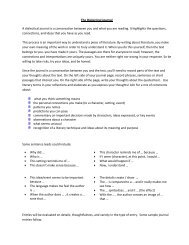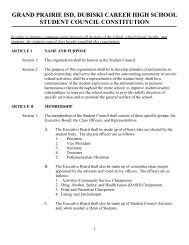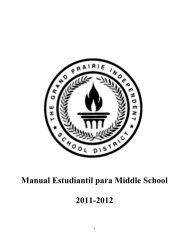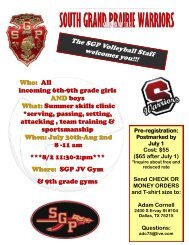Annotation and Dialectical Journal Instructions
Annotation and Dialectical Journal Instructions
Annotation and Dialectical Journal Instructions
Create successful ePaper yourself
Turn your PDF publications into a flip-book with our unique Google optimized e-Paper software.
<strong>Annotation</strong> <strong>and</strong> <strong>Dialectical</strong> <strong>Journal</strong> <strong>Instructions</strong><br />
As part of your summer reading assignment, you will annotate your text as you read <strong>and</strong> complete a dialectical<br />
journal. Below are definitions <strong>and</strong> examples of annotations <strong>and</strong> dialectical journals.<br />
<strong>Annotation</strong>s<br />
Annotating keeps the reader engaged with the text. While you are reading, use one or more of these strategies to<br />
mark the book <strong>and</strong> include your thoughts <strong>and</strong> questions.<br />
1. Write comments in the margin, especially to ask questions, relate to characters, make connections your own<br />
life, etc.<br />
2. Star any passages that are very important: events, decisions, or cause <strong>and</strong> effect relationships.<br />
3. Underline any sentences that made you think or appealed to you.<br />
4. Circle/highlight words that are unfamiliar.<br />
5. Bracket areas that you were confused about or did not fully underst<strong>and</strong>.<br />
<strong>Dialectical</strong> <strong>Journal</strong><br />
A dialectical journal shows your conversation with the text. It is used to question, make connections, <strong>and</strong> explore<br />
ideas you had as you read. Below is an example. Pre-AP ELA 6 through Pre-AP English II should have 12<br />
entries. They will be evaluated on details <strong>and</strong> thoughtfulness.<br />
Quote from Text<br />
Commentary<br />
Can be quotes about a<br />
character, an event or a<br />
scene<br />
“The flower garden was strained<br />
with rotting brown magnolia petals<br />
<strong>and</strong> iron weeds grew rank amid the<br />
purple phlox…the last<br />
graveyard flowers were blooming”<br />
(1).<br />
“A brilliant moonbeam was slanting<br />
through a gap in the curtains” (9).<br />
From the onset of the story,<br />
James Hurst creates the image<br />
of death through his description<br />
of the dying flowers <strong>and</strong><br />
specific reference to the<br />
“graveyard flowers.” The tone<br />
is heavy <strong>and</strong> dark creating a<br />
sense of foreboding.<br />
Since the author used the word<br />
slant, I picture a sharp ray of<br />
light into the room instead of it<br />
just shining. The details help<br />
me picture the room <strong>and</strong> I<br />
wonder if the moonbeam is<br />
keeping the character awake.<br />
Thoughts, comments, ideas,<br />
connections, underst<strong>and</strong>ings,<br />
recognition of literary devices<br />
Why did…<br />
This part about _____ makes me wonder…<br />
How are these similar…<br />
How are these different…<br />
What would happen if…<br />
Why…<br />
Who is…<br />
This section about ________ means…<br />
This reminds me of…<br />
This part is like…<br />
The character is like…<br />
This is similar to…<br />
The differences are…<br />
• I also …<br />
I never…<br />
This character makes me think of…<br />
This setting reminds me of…<br />
This is good because…<br />
This is hard because…<br />
This is confusing because…<br />
I like the part where…<br />
I don’t like this part because…<br />
My favorite part so far is…<br />
I think that…<br />
Oh, I get …<br />
Now I underst<strong>and</strong> …<br />
GPISD Pre-AP Summer Reading 12-13
DIALECTICAL JOURNAL SCORING RUBRIC<br />
LIMITED READER:<br />
perfunctory responses<br />
LITERAL READER:<br />
simple, factual responses<br />
THOUGHTFUL READER:<br />
somewhat detailed responses<br />
CRITICAL READER:<br />
detailed, elaborate responses<br />
1 2 3 4<br />
You find the text confusing, but don’t<br />
attempt to figure it out.<br />
You accept the text literally without<br />
thinking of different possibilities in<br />
meaning.<br />
You make connections to your own past<br />
experiences, feelings, or knowledge, but<br />
don’t explain in enough detail.<br />
You can “read between the lines” of the<br />
text.<br />
You don’t change your ideas about the<br />
text after re-reading it.<br />
You are reluctant to change your ideas<br />
about the text, even after re-reading it.<br />
You rarely change your ideas about the<br />
text even after you re-read it.<br />
You think about the meaning of the text in<br />
terms of a larger or universal significance,<br />
as aspect of self or life in general.<br />
You make few or no connections to the<br />
text <strong>and</strong> your ideas lack development.<br />
You don’t reach beyond the obvious to<br />
make connections to the text; you make<br />
few connections, which lack sufficient<br />
detail.<br />
You may agree or disagree with ideas in<br />
the text, but you don’t thoroughly explain<br />
or support your opinions.<br />
You create your own meaning through<br />
personal connections <strong>and</strong> references to<br />
other texts.<br />
You are sometimes confused by unclear or<br />
difficult sections of the text.<br />
You ask simple questions about the text.<br />
You consider different interpretations as<br />
you read.<br />
You think of some unusual responses but<br />
stay mostly with more obvious meaning<br />
of the text.<br />
You experiment with different ideas or<br />
think of original or unpredictable<br />
responses.<br />
You carry on an ongoing dialogue with<br />
the writer; you question, agree, disagree,<br />
appreciate, or object.<br />
Rubric can be found at www.alvord.k12.ca.us/.../EEnglish2H<strong>Dialectical</strong><strong>Journal</strong>ScoringRubric.doc<br />
GPISD Pre-AP Summer Reading 12-13
Of Mice <strong>and</strong> Men Reading Guide <strong>and</strong> Summer Reading Assignment<br />
Use the following points to guide your thinking as you read Of Mice <strong>and</strong> Men by John Steinbeck. These questions will also help you prepare for<br />
the essay question(s) you will have to answer in the first week of school.<br />
One aspect of John Steinbeck’s style is to create a setting so powerful, it can be viewed as a character. How did he use his beloved<br />
California to develop the characters <strong>and</strong> themes of the novel? Remember, setting is time, place, <strong>and</strong> objects.<br />
What words did John Steinbeck use when developing setting <strong>and</strong> character? Why did he pick those specific descriptors? How else could<br />
he have described them?<br />
Of Mice <strong>and</strong> Men is about relationships between people. Surface-level character traits can hide more complex traits. What can we see<br />
beyond a character’s actions?<br />
How does Steinbeck develop the theme of loneliness? How does he develop the theme of friendship?<br />
How does the time period of the Great Depression make Lennie <strong>and</strong> George’s relationship more meaningful?<br />
Of Mice <strong>and</strong> Men gets its title from the poem by Robert Burns, “To a Mouse.” How are people at times helpless to control their<br />
situation? Do plans always work out? Are efforts sometimes futile? Even when they seem futile, are they still worthwhile?<br />
Your summer reading assignment is to annotate the text <strong>and</strong> keep a dialectical journal as you read. Please see the annotation <strong>and</strong> dialectical<br />
journal instructions for more information. You should:<br />
annotate 18 or more passages in the text, <strong>and</strong><br />
respond with 12 or more entries in your dialectical journal.<br />
When school begins in August, bring your annotated text <strong>and</strong> dialectical journal to class. In the first week of school, you will write an essay using<br />
your annotated book <strong>and</strong> journal as a resource (so be thorough!).<br />
Happy reading!<br />
GPISD Pre-AP Summer Reading 12-13


